Historically Speaking - The Orzhov Syndicate

(Karlov of the Ghost Council | Art by Volkan Baga)
The Papal Families of Renaissance Italy
As enemy colors with diametrically opposed world views, white and black have always been an odd couple. However, their overlaps reveal a color identity obsessed with the clergy, sacrifice, and the afterlife, as both a matter of flavor text and game mechanics. Older cards show this mania for the hereafter and cards hitting the graveyards—look no further for example than cards like:
Or in the Otarian cycles, the memorable black and white pairing to make the ‘Cleric tribal’ decks that still pop up from time to time in Commander.
It’s therefore no surprise that the plane of Ravnica features the Orzhov Syndicate, something that Wizards of the Coast themselves have described as a cross between a church, a bank, and a crime family. The Orzhov Syndicate underwrites loans, does favors, and collects exorbitant interest in coin, blood, or - if you can't pay up promptly - your very soul.
Until recently, the Orzhov Syndicate was ruled by a combination of living prelates, advokists, thrulls, and a council of former leaders who have passed on but still command world-shaking power—the Obzedat. These ghostly guys:
Many of their other infamous activities can be seen in oppressive art featured on cards like Castigate and Conjurer's Ban.
To put it bluntly, the Orzhov Syndicate is what would happen if German theologian Martin Luther's worst complaints about papal indulgences, corruption, and overreach were not only demonstrably factual, but cranked up to 11 and set in a magical world.

This can be seen across all three visits to the plane of Ravnica. Note Orzhov Pontiff's gold brocade, the hectoring stance, and the girth of the waist. Clearly the Przhov aren't much for fiscal restraint. In Pontiff of Blight and Imperious Oligarch, we see the Orzhov extorting and exhorting others for donation, maintaining monopolies not only in money, but also in the realm of the afterlife.
Many of the Orzhov Syndicate’s mechanics (Haunt, Extort, Afterlife) and aesthetics are clearly designed with a nod towards the time just before the Protestant reformation in Renaissance Italy. The major Papal Families (Della Rovere, Sforza, Borgia) bear more than a passing resemblance to the Obzedat and Orzhov guild in general in terms of the structure of Papal Catholicism at the time.
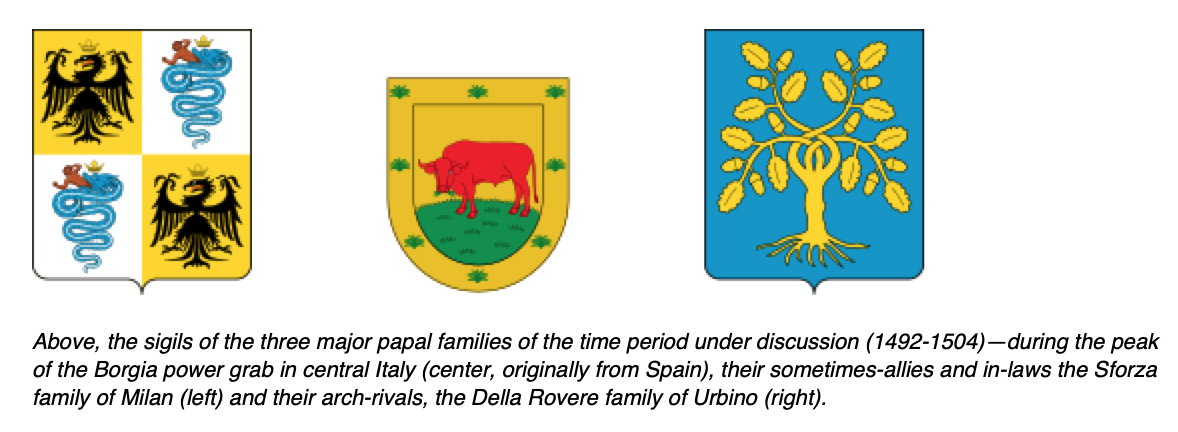
The feuding of the Papal families is mirrored in the Orzhov Syndicate's constant power struggles. While a one-to-one comparison is, of course, impossible ("This obscure bit of flavor text mirrors the language of a Papal Bull," etc.) it's worth discussing a more broad-strokes deconstruction of how black and white approaches the world, how that manifests in the Orzhov Syndicate, and the similarities between the Syndicate and the Italian Papal States, particularly under Alexander VI.
Mark Rosewater of Wizards of the Coast wrote this of the Orzhov (and in general, the black and white color pairing):
“Here's the dilemma. You can't win without alliances. Yet everyone ultimately needs to betray you to win. You have to trust people, yet can never truly trust anyone. That, my friends, is White/Black.”
Black and white, to sum up, is the definitive 'political operator' color pair. The colors of realpolitik, double-dealing, and backstabbing (yes, even more than the Golgari, which is no mean feat).
This systemized urge for self-aggrandizement at all costs that characterizes the Orzhov definitely applies to the high point of papal power struggles under the Borgias in Renaissance Italy. Rodrigo Borgia had a vision—according to historian Ada Palmer, he envisioned making the Papacy a hereditary monarchy for his family.
(Yes and no, that kind of monarch.)
Rodrigo's actions make total sense when you realize that his goal—and what his enemies (and sometimes allies) feared most—was a Borgia dynasty. To do this, he would have to become pope. That was just the first step of his plan.
One can never accuse Rodrigo Borgia of modesty, naiveté, or chastity (he had a small army of bastard children). He was a consummate politician and ever-calculating, always seeing the angles to any given situation. It’s wonderful to watch, even from a vantage point centuries removed. He married off his daughter, Lucrezia, to the powerful Sforza family in 1591. The Borgia children are fascinating in their own right, but we haven’t time to get into them at present. What you need to know is that political marriages like this were common, and Rodrigo was expert at making them, (and later, breaking them) when it suited his purposes.
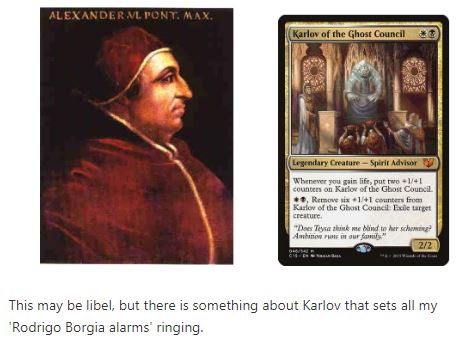
However, just because you’re an in-law of the Sforzas doesn’t mean that you don’t have to pay the proper prelates when the time for papal elections come, as they did the next year in 1492. Rodrigo wasted no time paying everyone he could get his hands on to vote for him—the 'BORGIAS' television show, to my consternation, highlights this as an example of just how evil Rodrigo was, and how edgy and rule-breaking the Spanish prelate must have been, but really, bribes and parceling favored positions were the chief way of getting oneself to the papacy in this era. Della Rovere, Borgia's archnemesis, did everything he could to prevent a Borgia papacy—but failed.
There are reasons the Borgias are vilified by contemporary (Italian) accounts of Rodrigo’s papacy. Everything that the Lannisters have been accused of in Game of Thrones—greed, bribery, incest, fratricide—was inspired by one school of historical documentation that is closer in line to pulp fictions and libel than history.
There is another school of thought that has emerged more recently: that this treatment and dependence on the fantastical claims of incest is pretty much a case of the rival Papal families wanting to, among other things:
- Look better by comparison by demonizing the Borgias, who, to their way of thinking, were dirty foreigners,
- Show up their hated rivals for having the temerity to nearly succeed at making an independent Papal state under their control, and
- Relieve their anxiety at how close the Borgias came to doing so.
(For more than my cursory look at this fascinating argument, see the works cited below.)
Considering this history, the flavor text on Purge the Profane seems quite apt.
And I think it's worth noting, before we proceed further, that there is more to the Orzhov than pure, ghostly simony, graft, and extortion (and murder!). As Wizards of the Coast repeatedly states, "Colors come in shades." That is to say, no one aspect or faction will ever totally define a color or color pair. Thusly, while the (seemingly) deathless Paruns of the Obzedat rule the roost in a way that would make their historical inspirations in Papal Italy proud, there are different tides at work in the day to day functioning of the Orzhov.
Enter Teysa.
The highest ranking mortal in the Orzhov power structure until the most recent set, Teysa is all the things that the Orzhov prize: patient, cunning and ambitious. As a powerful advokist (essentially a magical lawyer) she is an expert at political maneuvering, compromise, and exploiting the letter of the law, another wonderful trait of the black/white color combination. She prefers, in general, to negotiate and outwit rather than charge into battle or assassinations. In the world of Ravnica, she comes across as a reasonable authority figure for her guild, while still embodying its core ethos.
After all, it's hard to be ambitious if you have nowhere higher to go - and Teysa had the temerity to go outside the Orzhov (to these guys, actually):
She sought Tajic and Jace, by both appeal to justice and subtle manipulation, to overthrow the ghost council. Sadly, this attempt failed (you don't make it to the Ghost-Pope-Council by collecting bottlecaps, after all) but Teysa's attempt itself tells us about another side of black-white: a more measured, less maniacal side that is often overlooked in flavor. Willing to work with historic or philosophical enemies, even help them out, as long as the final accounting gives you what you wanted.
Now, back to tracking the analog versions of the Obzedat - the Papal States of Italy.
Rodrigo Borgia ascended to the papal throne on a wave of bribes and political acumen and became Alexander VI.
John Bond's 1929 book, 'In the Pillory: Life of the Borgia Pope' has a great (although perhaps a bit sensational) reaction shot from assembled pontiffs at Rodrigo's ascension:
"Even the cardinals that had voted for [Rodrigo Borgia] were fearful about their future, not without reason, as the sequel showed. The others who had cast their votes against him dreaded his vengeance, for they knew he was unscrupulous and vindictive. Cardinal Medici, a rather stout youth, even then fond of the pleasures of the table, paled as Borgia glared at him in passing. Young Medici later became the Pope Leo X, who excommunicated Luther. He was now terrified at Borgia's triumph. Turning to his fellow Cardinal Cybo he whispered in his ear: "Let us get away, we are in the jaws of a wolf that will devour us all."
Regardless of the misgivings of his fellow pontiffs, Rodrigo Borgia immediately begins appointing anyone with the last name Borgia to places of power, makes his eldest son Juan the head of the papal army (yes, the papacy had an army in those days) and immediately starts upgrading the Vatican in high style. He spent lavishly, bought men, recruited toadies in every level of government, and generally tried to solidify his position as supreme vicar of Christ, with an eye towards succession and central Italian real estate.
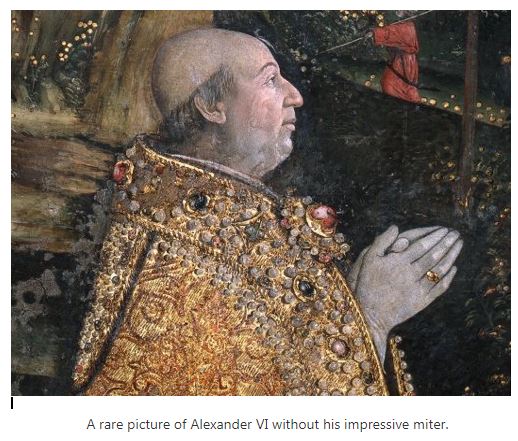
Della Rovere, naturally, isn’t thrilled that his archnemesis just bought the Papacy out from under him. After all, Bribery is only wrong when someone else does it better than you!
He begins planning a retribution that would change the face of Italian politics forever—and eventually would end with him claiming the big chair himself year later. But for the moment, Della Rovere contents himself, in 1494, to inviting the king of France (I love this king’s name—Charles the Affable) to invade Italy.
The Italo-Frankish war is a complicated business (considering how short it was) but the main takeaways were as follows:
- Charles the Affable invades Italy at Della Rovere’s request
- Charles the Affable takes Milan and would have taken and sacked Florence, if not for a religious fanatic named Savonarola getting a critical on his ‘charm person’ roll before proceeding to do the thing he’d wanted to do—deal with Rodrigo Borgia.
- Rodrigo Borgia shows why he won the papal bribe-off instead of Della Rovere—and counter-bribes the invading French king by making him the official king of Milan (ok, a split with the Sforza family) and all of Naples.
"Big deal," you might say. "Two cities for his life, that’s pretty cheap."
Look at a map of Italy during this time period.
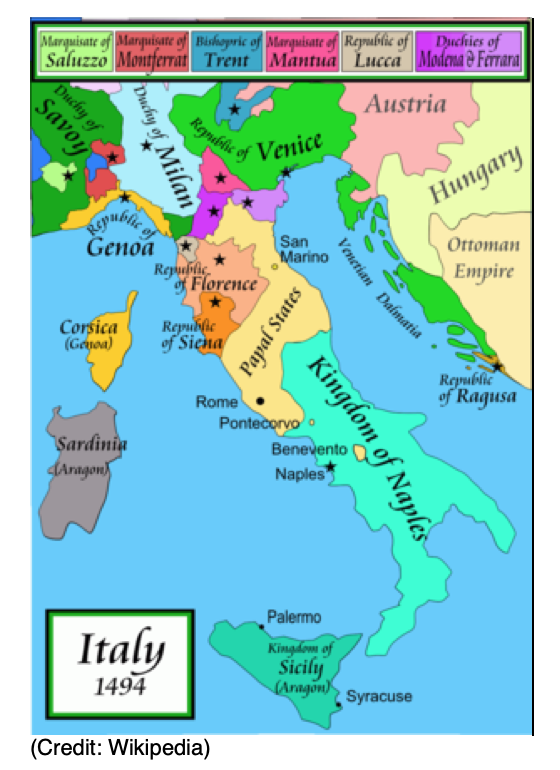
- Rodrigo Borgia just gave away two thirds of the peninsula to a foreign power to keep his Pope’s miter.
- He immediately realizes this is a bad idea, and welshes on his bribe the second he can safely do so (i.e. when Charles the Affable marches to Naples),
- He rallies every remaining Italian city-state he can (and a few more outside powers) and forces the French to come to battle, abandoning their looting campaign in Naples and heading north to Milan.
- The ensuing battle is one where both declare victory—the Italian allies won the big picture (strategic victory) while the French won the field (tactical victory).
Here's where Rodrigo uses his extra-temporal power in a truly brilliant gambit to force Charles the Affable to relent. This was a major aspect to Papal power, and to the Orzhov Syndicate - earthly force is something that every major player has in both Ravnica and Europe of this time. But only the Orzhov and the Papal State under the Pope have the power to effect your fate in the hereafter.
This was a formidable political stick in a religious time. Not only would you be exiled from any chance of heaven, but you would be out of the good graces of all other Christian countries. Thusly, excommunication, to be effective, had to be used sparingly to retain both shock-value and rarity.
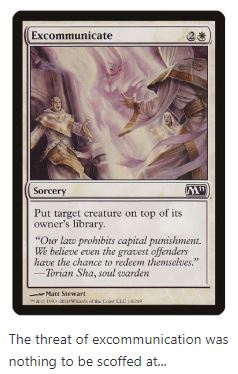
Rodrigo ultimately uses this lull in the action to threaten Charles the Affable with excommunication—he would be exiled from the Catholic Church and thus Heaven if he persisted in attacking Italy. Charles the Affable books it back to France—but the French would be back later.
Della Rovere would get his revenge. Italy’s troubles for the next few centuries were just beginning. The events of the Borgia papacy and Della Rovere’s counterblow would help set the stage for the Protestant Reformation, about a century later with Martin Luther.
A Twisted Syndicate
This is just the sampling of the complex geopolitical horse-trading the characterized the era, and which perfectly exemplifies the Orzhovian twists and turns of the Papacy. I wish I had the space for a full dissertation on this topic. However, the example I just gave perfectly demonstrates the characteristics of the Orzhov syndicate—use of wealth as a weapon, constant wheeling and dealing (hey, it’s not for nothing that the Orzhov guildhall is called ‘The Church of Deals’) and use of the afterlife as a bludgeon to force those who disagree with you into towing the party line.
The very aesthetic of the Orzhov (obsession with wealth, particularly gold for example) screams Renaissance Italy. However, with the events of Ravnica: Allegiance, and the purging of the Obzedat, the Orzhov may look like a very different beast in future sets--a Syndicate no longer haunted by ghosts.
Works Cited
- Bond, John “In the Pillory: Life of the Borgia Pope.” https://en.wikisource.org/wiki/In_the_Pillory:_The_Tale_of_the_Borgia_Pope Originally published 1929
- Coast, Wizards of the “Guildpact Style-Guide: Orzhov” https://magic.wizards.com/en/articles/archive/arcana/guildpact-style-guide-orzhov-2006-03-27 March 27 2006.
- Lee, Alexander “Were the Borgias Really so Bad?” https://www.historytoday.com/alexander-lee/were-borgias-really-so-bad October 2013
- Rosewater, Mark “Playing by Their Own Rules” https://magic.wizards.com/en/articles/archive/making-magic/playing-their-own-rules-2006-03-27 January 1st 2012
- Rosewater, Mark “Designing for Orzhov” https://magic.wizards.com/en/articles/archive/making-magic/designing-orzhov-2013-03-25 March 25 2013
- Palmer, Ada. “Machiavelli part III: Rise of the Borgias” https://www.exurbe.com/machilavelli-iii-rise-of-the-borgias/
Thank you for joining me, and see you next month!
EDHREC Code of Conduct